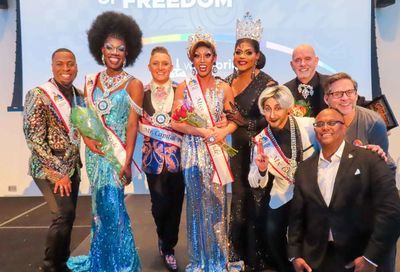Kim Davis mentioned in first round of second GOP debate
Debate over discrimination against Muslims segues into showdown over alleged "persecution" of Christians

The first round of the second GOP debate featured a heated showdown between the four second-tier candidates over the issue of religious liberty for people who object to same-sex marriage, including county clerks like Kim Davis and Christian bakers, florists and business owners who wish to deny service to LGBT people.
Sen. Lindsey Graham (R-S.C.), Gov. Bobby Jindal (R-La.), former Gov. George Pataki (R-N.Y.) and former Sen. Rick Santorum (R-Pa.) exchanged some heated words over their interpretation of what occurred in the case of Davis, the Kentucky clerk who went to jail for five days for refusing to issue marriage licenses to same-sex couples.
The exchange was initially sparked by a question about 14-year-old Ahmed Mohamed, the Texas teenager who was arrested for bringing in a homemade clock to school which his teachers assumed was a bomb. When asked about Mohamed’s arrest, Jindal only briefly said he was happy that Mohamed had since been released, with the bulk of his answer criticizing American Muslims for not more vocally calling out or criticizing Islamic extremists. Jindal then shifted focus, claiming that it is actually American Christians who are the most under attack for their beliefs, specifically referring to Davis.
“I’d like the Left to give us a list of jobs that Christians aren’t allowed to have,” Jindal said, noting that he had signed into law an executive order granting wide-scale religious exemptions for people who oppose homosexuality or same-sex marriage. “If we’re not allowed to be clerks, bakers, musicians, caterers, are we allowed to be pastors anymore? We’re not allowed to be elected officials. It isn’t breaking the law to exercise our constitutional rights.”
“I am not worried about Kim Davis attacking me,” said Graham, trying to turn the issue back to the major theme of his largely one-note campaign: fighting Islamic extremism, including by sending 20,000 troops overseas to fight Islamic state radicals. “I am worried about radical Islamic terrorists who are already here planning another 9/11. We’re at war, folks. … Here’s the reality: young men from the Middle East are different from Kim Davis.”
But Pataki disagreed with the others’ interpretation of the Kim Davis situation, saying he would have fired her for refusing to do her job.
“Yes, Kim Davis is different from Islamic radicals from the Middle East,” Pataki said. “But on the other hand, we have one rule of law in America. An elected official can’t say that I’m not going to follow that law if it conflicts with my beliefs. We have to uphold the rule of law. … There’s a place where religion supersedes the rule of law. It’s called Iran. It shouldn’t be the United States.”
Santorum disagreed with Pataki, invoking the memory of Cassie Bernall, the Christian girl who was slaughtered during the Columbine High School massacre in 1999, and comparing her status as a hero for staying true to her faith with the negative responses that Davis has received for following her religious beliefs.

“People have a fundamental right, in the First Amendment. There’s no more important right. It is the right, it is the trunk that all other rights come from, and that’s the freedom of conscience. And when we say, in America that we have no room, how many bakers, how many florists, how many pastors, how many clerks are we going to throw in jail, because they stand up and say, ‘I cannot violate what my faith says is against its teachings?’ Is there not room in America? I believe there has to be room.”
Santorum then used the opportunity to tout the importance of passing the First Amendment Defense Act (FADA), which would provide exemptions to businesses, individuals and even government workers who do not want to provide services to LGBT people. Santorum also said that the next president needs to fight back against judicial overreach — or what he called “judicial supremacy” — by the Supreme Court.
Pataki appeared incredulous that Santorum would willfully defy the Supreme Court, sparking a debate among the four candidates over the authority of the Supreme Court and whether it can interpret the law. Santorum and Jindal spoke of the illegitimacy of the court in making law, while Graham and Pataki focused more on the fact that those who wish to reverse the court’s ruling on same-sex marriage can do so by passing a law through the Congress. In the meantime, they said, they need to abide by the Supreme Court’s ruling finding state marriage bans on same-sex marriage to be unconstitutional.
“There is a huge difference between an individual standing up and saying, ‘I am going to stand for my religious freedom and my religious rights,” said Pataki. “I applaud that. This is America. You should be able to engage in your religious beliefs in the way you see fit. But when you’re an elected official, and you take an oath of office to uphold the law, all the laws, you cannot pick and choose, or you no longer have a society that depends on the rule of law.”
Santorum tried to draw a comparison between Davis’ stance and that of Martin Luther King, Jr. going to jail to defy segregation, saying that what the Supreme Court did is against natural law and God’s law, and that people need to defy the law. But Pataki pointed out that King was willing to go to jail in defying the law to send a message to lawmakers that the law needed to change, rather than acting as an agent of the government.
All four candidates also stressed that they would appoint conservative judges — particularly those who oppose abortion in all instances, are strict constitutionalists and believe in traditionalism — to the Supreme Court, with Graham stressing the importance of a electing a Republican president who would name conservative justices to the nation’s highest court.
“The biggest prize on the table in 2017 is the presidency,” he said. “If it is Hillary Clinton, Joe Biden or Bernie Sanders, they’re going to pick people that we disagree with all the time. Please understand we have to win this election. The court’s at stake. It is the most important reason for us to turn out to make sure we don’t lose the judiciary for decades to come.”
Support Metro Weekly’s Journalism
These are challenging times for news organizations. And yet it’s crucial we stay active and provide vital resources and information to both our local readers and the world. So won’t you please take a moment and consider supporting Metro Weekly with a membership? For as little as $5 a month, you can help ensure Metro Weekly magazine and MetroWeekly.com remain free, viable resources as we provide the best, most diverse, culturally-resonant LGBTQ coverage in both the D.C. region and around the world. Memberships come with exclusive perks and discounts, your own personal digital delivery of each week’s magazine (and an archive), access to our Member's Lounge when it launches this fall, and exclusive members-only items like Metro Weekly Membership Mugs and Tote Bags! Check out all our membership levels here and please join us today!






















You must be logged in to post a comment.